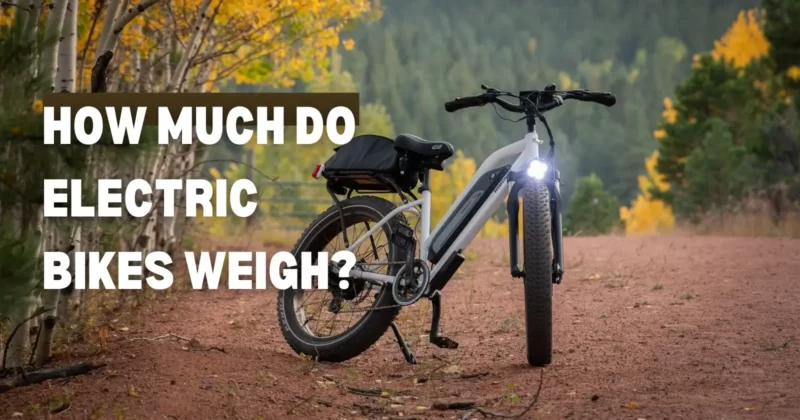How Much Do Electric Bikes Weigh? [5+ Factors Affecting E-Bike Weight]

Electric bikes, also known as e-bikes, have taken the transportation world by storm. These bikes are equipped with an electric motor that provides assistance while pedaling, making them a popular choice for commuters and outdoor enthusiasts alike.
With their ability to tackle hills with ease and help riders maintain a consistent speed, it’s no wonder that electric bikes have seen such a surge in popularity in recent years.
More and more people are turning to electric bikes as an eco-friendly alternative to traditional bicycles or gas-powered vehicles. The convenience of effortlessly cruising through city streets or exploring rough terrains has captured the attention of individuals seeking both practicality and excitement in their rides.
But before you jump on this electrifying trend, it’s important to understand one crucial aspect: the weight of these nimble machines.
In this article, we will explore the topic, “How much do electric bikes weigh” – discussing what factors contribute to their overall heft and how this can impact your riding experience. From battery size to frame materials, there is much to consider when selecting an e-bike that suits your needs.
So let’s dive deeper into the world of electric bike weight and discover why this element plays a vital role in performance and functionality!
Table of Contents
Factors Affecting E-Bike Weight
What makes electric bikes heavy? There are many factors that can affect the overall weight of an electric bike. Want to know more about this? Keep reading!
1. Battery Size:
One of the most significant factors contributing to the weight of an electric bike is the size and capacity of its battery. Larger batteries with higher power outputs generally provide increased range and performance but also add to the overall weight.
E-bikes with larger batteries can weigh anywhere from 10 to 15 pounds heavier compared to those with smaller batteries.
2. Frame Materials:
The choice of frame material plays a crucial role in determining an electric bike’s weight. Aluminum frames are commonly used due to their lightweight nature, making them ideal for riders who prioritize agility and maneuverability.
On the other hand, carbon fiber frames offer even greater strength-to-weight ratios, resulting in exceptionally lightweight e-bikes that excel in speed and efficiency. However, it’s important to note that carbon fiber frames come at a higher cost.
3. Other Components:
In addition to batteries and frame materials, various other components contribute to an electric bike’s overall weight.
These include motor systems (especially mid-drive motors), which tend to be heavier than hub motors due to their additional mechanical elements like gears or belts. Accessories such as racks, fenders, lights, or suspension systems can also increase an e-bike’s weight significantly.
It is crucial for potential buyers of electric bikes to carefully consider these factors while choosing a model that aligns with their specific needs.
While lighter bikes may offer more agility and easier handling for urban commutes or recreational rides, heavier models might provide longer ranges or improved stability during off-road adventures. Ultimately, finding the right balance between weight and performance is key when purchasing an electric bike
Importance of Weight Considerations:
When it comes to electric bikes, weight is an important consideration that can greatly impact performance. One area where weight plays a significant role is in acceleration and handling.
A lighter e-bike will generally have quicker acceleration and be more nimble on the road. This means that you’ll be able to zip through traffic or maneuver tight turns with ease.
On the other hand, heavier e-bikes may feel sluggish when starting from a standstill or navigating corners. This is especially true if you’re riding in busy urban areas where quick stops and quick starts are common.
The added weight can also make it more difficult to control the bike at higher speeds, potentially compromising your safety. But why does weight affect acceleration and handling?
Well, it all comes down to physics. When you apply force to accelerate a bike, whether through pedaling or using the electric motor assist, a lighter bike requires less effort because there’s less mass for you to push forward or propel forward with support from the motor.
In addition to affecting acceleration and handling, weight also has implications for range – how far your e-bike can go on a single charge. Generally speaking, lighter e-bikes tend to offer better range compared to their heavier counterparts due to increased energy efficiency.
The battery size has an indirect relationship with total bike weight as well – larger batteries typically lead to higher overall weights which in turn could limit the distance traveled per charge.
Therefore keeping both frame materials lightweight and opting for smaller battery sizes enhances range capabilities significantly as riders won’t have excess unnecessary burden slowing them down during their journeys.
So if having longer rides on one charge is something that matters most then going over these factors becomes critical such as keeping total electric bike weight light while still being assisted by compatible powertrains
Typical Weight Range for Different Types of E-Bikes
Below is a list of weight ranges for various types of e-bikes. This information can be helpful when considering which type of e-bike to purchase, as weight can affect the ease of transportation and maneuverability.
1) Commuter e-bikes
Commuter e-bikes are designed for urban or city riding, with a focus on comfort and practicality. These bikes usually have a step-through frame, upright seating position, and fenders to protect riders from road spray.
In terms of weight, commuter e-bikes generally range from 40-60 pounds (18-27 kilograms). This weight includes the battery pack and additional components like lights and racks.
2) Mountain e-bikes
Mountain e-bikes are built to handle rough terrains and steep hills. They often feature a more robust frame, wider tires with aggressive treads, front suspension forks, and powerful motors for added torque.
As they are designed to withstand off-road conditions, mountain e-bikes tend to be heavier than other types of e-bikes. Their weight can vary between 50-70 pounds (23-32 kilograms), depending on factors such as frame material and motor power.
3) Folding e-bikes
Folding e-bikes combine the convenience of compact size with electric assistance. These bikes are perfect for commuters who need to transport their bike in small spaces or public transportation when necessary.
Due to their smaller frames and lightweight construction materials like aluminum alloys or carbon fiber composites, folding electric bikes typically weigh around 30-45 pounds (14-20 kilograms).
4) Road E-Bike
Road electric bikes aim to provide speed while maintaining efficiency on paved surfaces. They feature sleek designs that prioritize aerodynamics with drop handlebars similar to regular road bicycles but come equipped with an integrated electric drive system for an extra boost when needed.
The average weight range for road e-bikes falls between 35-55 pounds (16-25 kilograms). Again this will depend on various factors including battery size capacity varying among different models available in the market.
Overall, it’s important to note that these weight ranges are approximate, and individual models within each category may fall slightly outside of these ranges.
Additionally, advancements in technology and materials used in electric bikes will continue to influence their overall weight as new lighter components become available.
Trade-offs and Considerations
When it comes to electric bikes, the weight can be a crucial factor that riders should consider. While a lighter e-bike may seem appealing for its ease of maneuverability, there are trade-offs to be aware of.
One such trade-off is durability. Electric bikes with lighter frames or components may not withstand rough terrains or heavy usage as well as their heavier counterparts.
Therefore, if you plan on taking your e-bike on adventurous off-road trails or using it frequently for commuting, a slightly heavier model with sturdier construction might be worth considering.
Stability is another consideration when it comes to e-bike weight. A heavier bike tends to provide more stability while riding at high speeds or when navigating corners and turns.
This can be particularly important for those who prioritize safety and want extra reassurance during their rides. On the other hand, some riders prefer lighter electric bikes because they offer agility and nimbleness which can make them easier to handle in city traffic or crowded areas.
Lastly, the cost is also an aspect that needs careful consideration along with weight when choosing an electric bike. Lightweight models often come with a higher price tag due to the materials used in their construction.
So before making a purchase decision solely based on weight, it’s essential to evaluate your budgetary constraints and weigh them against what you’re looking for in terms of performance.
Frequently Asked Questions Related to E-Bike Weight:
Are electric bikes heavy to lift?
Electric bikes can be heavy to lift, especially compared to traditional non-electric bikes. Some electric bikes can weigh well over 50-60 lbs, and there are even bike lifts and stands designed to assist with lifting e-bikes that weigh over 100 lbs.
The weight of an electric bike can make it challenging to lift for certain tasks such as maneuvering, loading onto a car rack, or carrying upstairs.
However, there are electric bike lifts available that feature an ergonomic design and a powerful electric motor to effortlessly lower the e-bikes to the ground, eliminating the need for heavy lifting or straining your back.
Are all electric bikes heavy?
Not all electric bikes are heavy. There are electric bikes designed for heavier riders, with weight capacities of up to 550 pounds, such as the Worksman Stretch trike and the Lectric XPedition.
These bikes are specifically built to accommodate larger individuals and provide a safe and enjoyable riding experience. Additionally, there are various options available in the market, including heavy-duty electric bikes tailored for big guys and heavy adults.
What is the weight of pure EV Epluto 7G?
The weight of the pure EV Epluto 7G is 79 kg. This electric scooter is designed with a focus on performance and efficiency, making it a popular choice for those looking for a reliable and eco-friendly mode of transportation.
Conclusion on How Much Do Electric Bikes Weigh
In conclusion, the weight of an electric bike is influenced by various factors such as battery size, frame material, and additional components. While a lighter e-bike may offer greater maneuverability and ease of handling, it may sacrifice some range or power capabilities.
On the other hand, a heavier e-bike may provide better stability and durability but could be more challenging to transport or ride in hilly terrain. When choosing an electric bike, it’s important to consider your own priorities.
If you prioritize speed and agility, opting for a lighter model with smaller batteries might be the best choice. However, if you value long-distance rides or tackling uphill climbs without much effort, then a slightly heavier e-bike with a larger battery capacity could suit your needs better.
Ultimately, finding the right balance between weight and performance will depend on personal preferences and specific usage scenarios. It’s worth testing different models before making a decision so that you can experience firsthand how each bike’s weight affects its handling and overall usability.
Remember that while weight plays an essential role in determining an electric bike’s performance characteristics, there are other crucial aspects to consider as well—such as motor power output efficiency levels of assist modes—to ensure optimal enjoyment from your two-wheeled investment.
So go ahead and explore the world of electric bikes with confidence in knowing what elements impact their weights—and make an informed decision that aligns perfectly with your unique riding requirements!
